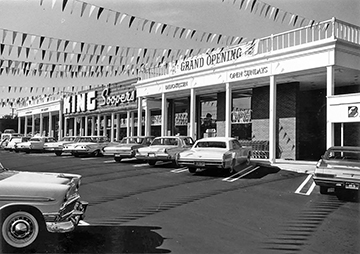
by Charles Bonniwell | May 16, 2025 | Main Articles
by Charles C. Bonniwell

Classic Development: The Belcaro Shopping Center was built in 1960 and considered a real asset to the adjoining Belcaro Park neighborhood. The Kentro Group’s proposed 12- to16-story low income apartments are considered by residents as little more than an eyesore that will acerbate traffic jams in the area.
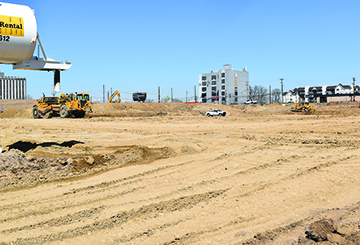
Brave New Future: A once campus-like setting of the Colorado Department of Transportation facility is being replaced by the Kentro Group’s massive 103,000 square foot King Soopers and low income housing. The expected completion is Spring 2026.
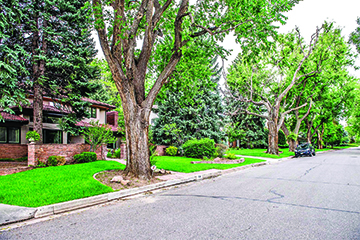
High Density Development Coming Soon: Belcaro is an affluent neighborhood in Denver known for its large ranch-style homes and tree-lined streets. It is located between Cherry Creek and Washington Park, featuring the historic Phipps Mansion and a high average household income. It sits West of the proposed redevelopment on South Colorado Blvd.
The City and County of Denver is known for its extraordinary neighborhoods. Those neighborhoods are represented not only by city councilmembers, but also formal neighborhood associations (HOAs) formally recognized in the city statutes. Many of these neighborhoods are tree-lined sanctuaries that almost resemble suburban enclaves.
The neighborhoods, especially the ones dominated by single family homes, are dimly viewed by the progressive Denver city planners at the Denver Community Planning and Development Department. They are seen as being anachronistic and an impediment to the type of very high density needed for a “sustainable” future for Denver.
Developers, in turn, realize that a key to profitability for them is turning low density areas in Denver into high density ones which could result in greater possibilities for “affordable housing” in the city.
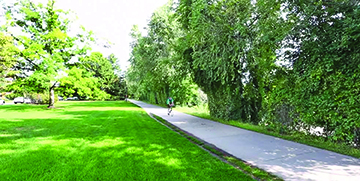
More 24-hour Traffic Coming Soon: Virginia Village is a neighborhood in Denver with a population of 16,326. Virginia Village offers a balanced lifestyle with ample green spaces and recreational facilities. Parks like Garland Park and Ash Grove Park provide residents with opportunities for outdoor activities. Now, it is coming under threat with a new 103,000 square foot King Soopers coming to town.
The battles between developers aligned with Denver city planners on one side and neighborhood residents on the other are breaking out throughout the city. At one time, neighborhood HOAs in Denver were politically powerful, but no longer. Occasionally, the residents win one of those battles (February edition of the Chronicle — “Park Hill Golf Course Miracle”). But those victories are few and far between.
One of those battles is going on along Colorado Blvd. Kentro Group, a Denver real estate developer, is engaging in two such developments that have outraged the Belcaro Park and Virgina Village neighborhoods. The development scheme involves reversing what the Denver city planners view as obsolete thinking of having commercial businesses and residential areas physically separated.
As they view it why not put residences in the form of affordable apartments on busy streets like Colorado Boulevard while moving high volume retail into or next to single family home areas?
King Soopers, a division of Cincinnati based Kroger Company, had operated a grocery store at a 7-acre site, 825 South Colorado Blvd., for over 65 years. It elected to close the store, sell the property to the Kentro Group, and build a new 113,000 square foot facility a mile south in the Virgina Village neighborhood. The 13.5-acre site on
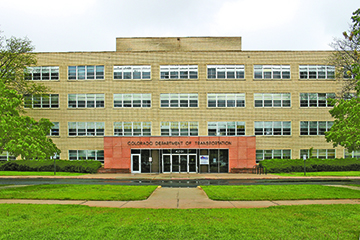
The Campus: The old CDOT headquarters off Colorado Blvd. on Arkansas Avenue had a campus like aspect to it with no traffic after 5:30 p.m. or on weekends and fit in well within the Virginia Village neighborhood.
ce housed the CDOT campus headquarters between Arkansas and Louisiana Avenues and was purchased by the Kentro Group in 2018 for $19.3 million.
The site was zoned CMP-E12 or campus, educational/institutional site. It is limited to a maximum of 75 feet within 175 feet of protected areas, i.e. single-family homes. The idea that single family homes are to be protected is no longer a concept recognized by the Denver Planning Department. The entire property was quickly rezoned for high density apartments and commercial uses.
Kentro Group, with the blessing and encouragement of the Planning Department, built a four-story 151-unit low-income apartment complex called Krisana Apartments abutting the single-family homes. Next to it will be a 113,000 square foot new King Soopers that will generate high traffic and will stay open into the night to the detriment of the Virginia Village neighborhood.
Next up for Kentro Group and the progressive city planners was the redevelopment of the 7-acre Belcaro Shopping Center. Facing off against them were residents of the low-density, single-family neighborhood to the west of the old grocery store and an active Belcaro Park HOA.
At the preliminary development review meeting over a year ago the residents told Kentro Group and the city planners w
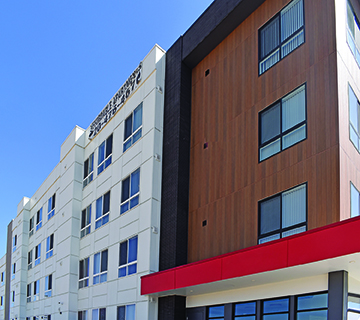
New Neighbor: Krisana is a 151-unit, 4-story apartment community located at Arkansas Avenue and Birch Street just east of Colorado Blvd. Krisana is now imposed on the Virginia Village neighborhood.
hat they thought of the 12- to 16-story low-income housing apartment building with first floor retail use.
The residents pleaded for a maximum of three stories redevelopment which appeared to fall on deaf ears. Kentro principal Chris Viscardi told the hostile crowd that “I think there’s an opportunity here.” Some agreed that there was an opportunity, but it was for the Kentro Group to help destroy a neighborhood for its own gain.
When later asked by a reporter for the Denver Gazette whether the city was the one pushing for a higher, denser project than what was originally envisioned, the Kentro Group conceded the same.
Sue Clinton, a Belcaro resident, stated at the meeting that: “The city is driving this change and not really listening to the neighborhood.” She noted that in her mind the neighborhood conveyed a suburban, rather than an urban feel, which the city planners wanted to alter.
Others noted that at one time city planners were the advocates for the residents of the city rather than its enemies seeking to destroy a way of life many have cherished for years.
With the Denver housing market already beginning to suffer and Downtown Denver badly struggling, some residents are beginning to wonder with developers like Kentro Group and city planners like those Denver Planning Department whether housing affordability will someday be the least of the city’s concerns such has occurred in cities back East.
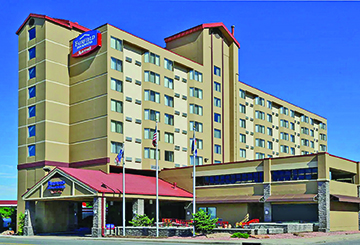
by Charles Bonniwell | May 16, 2025 | Main Articles

Good Work: Rich Wyatt leads fundraising efforts in Colorado for the Tunnel to Towers Foundation to raise money for homeless veterans.

Hotel Conversion: The former Fairfield Inn on Colorado Blvd. will be converted into housing for veterans by Tunnel to Towers Foundation.
by Charles C. Bonniwell
The Tunnel to Towers Foundation founded by Frank Siller, in honor of his brother Stephen who died during the September 11 attacks in 2001, is a nonprofit foundation that supports families of fallen first responders and veterans while working to end veteran homelessness.
The organization is best known for retiring the mortgages for families of first responders who were killed in the line of duty. It also builds and gives mortgage free “tiny homes” (500 sq. feet) to eligible veterans.
Residences
Tunnel to Towers more recently has begun converting hotels into residences for homeless veterans in Atlanta, Memphis, Las Vegas, and now Denver. It plans to have six more properties purchased and remodeled over the next several years.
Tunnel to Towers acquired the Fairfield Inn hotel property at 1680 S. Colorado Boulevard (corner of Colorado Blvd. and East Mexico Ave. near I-25 and Colorado Blvd.) for $12.7 million in September of 2024.
It is to be converted into 120 apartments for homeless veterans in the Denver metropolitan area, The site will also feature support services including job training, benefit assistance, PTSD counseling, and addiction.
It is estimated that there are over 400 homeless vets in the Metro Denver area.
Fundraising
An additional 8 to 10 million dollars is estimated to be needed to convert and update the property.
In Colorado, fundraising is headed up by Rich Wyatt, who was a volunteer fireman, former police chief, and was featured in a reality TV show titled American Guns along with family members.
Wyatt became involved with Tunnel to Towers when his reality show, back in 2017, became very popular with disabled veterans. He would organize and lead gun adventures with disabled vets who had a high risk of suicide attempts, due to their inactivity caused by their disabilities, with little to look forward to.
On Wednesday, May 7, 2025, Wyatt held a breakfast fundraiser across the street at 3900 E. Mexico hosted by Dutton Commercial Real Estate. In addition, 710 KNUS Radio host Peter Boyles spoke at the fundraiser which was headlined by 9/11 fireman survivor Tim Brown who inspiringly talked about his experiences on 9/11.
Wyatt and Tunnel to Towers are looking for individuals who will host fundraisers at their homes or businesses. If interested in doing so, call Wyatt at 303-475-5007. For more information on the Tunnel to Towers Foundation, visit www.t2t.org.
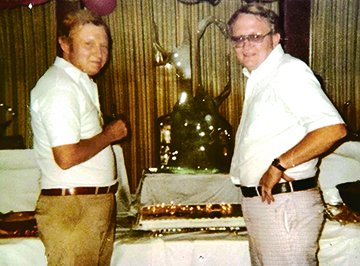
by Mark Smiley | May 16, 2025 | Main Articles
Dean Peterson, Co-Founder Of The Bull & Bush Brewery Died At Age 87
by Mark Smiley

Founding Fathers: Identical twin brothers Dean (right) and Dale Peterson (who passed away in 2009) often rode their bikes by the local dairy that would one day be the home of The Bull & Bush Pub and Brewery. In 1971, casting aside their stockbroker careers, the brothers built the Bull & Bush to kick-start a list of successful restaurants.
On May 3, 2025, Dean Peterson, co- founder of the Bull & Bush Brewery in Glendale passed away at age 87. Regarded by many as a pioneer in the industry, Peterson, along with his identical twin brother Dale, co-founded the Bull & Bush Pub and Brewery in 1971 in Glendale, Colorado. Back in those days, there was not much other than farmland around and it was difficult to get a loan from the bank. In fact, as you looked West from the Bull & Bush, you could see the old Riviera sign on Kentucky Avenue with nothing obstructing the view. Glendale was a few years away from becoming the spot for nightlife and the Bull & Bush was at the forefront.
Inspired by a fact-finding trip to England, they modeled their establishment after the original Bull & Bush Pub in Hampstead Heath, London, which dates back to 1645. They imported authentic artifacts, including a now-iconic warped copper top bar, to recreate the traditional English pub atmosphere.
The Peterson brothers were born in Lincoln, Nebraska, in 1937. Dale Peterson passed away in 2009 while Dean outlived his brother by nearly 16 years. After a three-year battle with cancer, Dean Peterson passed away. A celebration of life brought a standing room only crowd to the Bull & Bush Brewery on May 20, 2025. Dean’s nephews, David and Erik Peterson, entertained the crowd and kept the mood upbeat while others shared stories.
Peterson was born in Nebraska but moved to Denver as an infant. He and his twin brother and older sister, Charlene, lived at
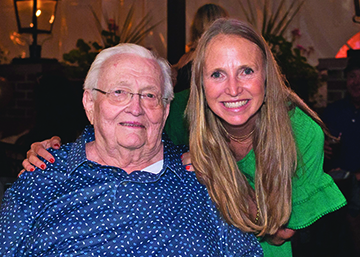
Dean and His Daughter: Dean Peterson and his only daughter Tami Beardsley pose for a photo a few years ago. Beardsley was the inspiration for the iconic Bull & Bush logo.
6th and Albion for years and Dean graduated from East High School in 1955. Fast forward to 1971, when they founded the Bull & Bush Brewery, Dean was seen as the back of the house “number cruncher” while Dale was the front of the house “glad hander.” It is in that back of the house, where Dean thought it would be a good idea to put their now famous green chili on top of mashed potatoes. He came up with this concept in the late 1970s and it is still on the menu today.
Just because he was seen as the back of the house owner, doesn’t mean Dean did not enjoy sitting at the bar talking to guests and swapping stories. “People would sit at the bar and get advice they didn’t need or want,” said David Peterson, co-owner of the Bull & Bush Brewery. “But everyone loved Dean.”
“My fondest memories of my uncle had nothing to do with the restaurant,” said Peterson. “Our family trips were a lot of fun and as we got older, we started to go to places like Las Vegas. We always had a great time with family and Dean was a big part of that.”
Initially, the Bull & Bush served as a lively gathering spot, featuring live music and one of Denver’s first dart rooms. In 1997, the Petersons expanded the establishment by adding a brewery, which has since gained acclaim for its innovative beers. Notably, their “MAN BEER” received a Gold award at the World Beer Cup.
Today, the Bull & Bush remains a family-run business, operated by David and Erik Peterson. They have continued the legacy by maintaining the pub’s welcoming atmosphere and commitment to quality. The establishment offers a diverse menu, a wide selection of whiskeys, and continues to brew award-winning beers, solidifying its status as a cherished Glendale institution, an institution that started with the late Dale and Dean Peterson. “We are forever grateful for the sacrifices my dad and uncle made 54 years ago,” said Peterson. “May Dean rest in peace and look down on how we continue to put smiles on people’s faces that walk through our doors.”
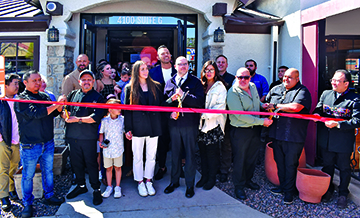
by Mark Smiley | Apr 18, 2025 | Main Articles
The Family-Owned Restaurant Opens First Location In Denver
by Mark Smiley

Now Open: Los Dos Potrillos opened at 11 a.m. April 15, 2025, with a ribbon cutting ceremony. Los Dos takes over the space formerly occupied by Hacienda on South Colorado Boulevard. It is the first restaurant for the family in the city of Denver after decades in the suburbs.
Los Dos Potrillos, the family-owned Mexican restaurant known for its Mexican comfort food opened its first Denver location near Colorado Boulevard and I-25 at 4100 E. Mexico Avenue on April 15, 2025. The space was formerly occupied by Hacienda. The new Los Dos Potrillos has space for 253 patrons inside and 70 more on its patio.
They have been eyeing locations in Denver over the last several years but could not find the right area. “Whenever we look at any type of location, we always want to make sure it fits our way of going into any type of property,” said Danny Ramirez, CEO of Ramirez Hospitality Group, who owns Los Dos Potrillos. “We look forward to becoming a welcoming haven for our growing community, offering the same quality, consistency, service, and commitment that defines the Los Dos family,” Ramirez.
“Expanding to Denver is an important step for us, allowing us to connect and serve a new group of diners. Our Los Dos family is excited about this growth and cannot wait to bring our delicious food and overall dining experience to a new community in such a centralized location,” added Luis Ramirez, COO and President.
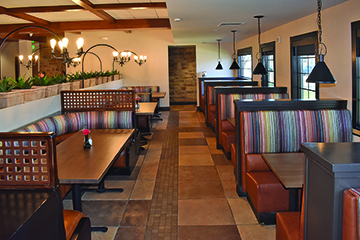
Fresh Remodel: Los Dos Potrillos spent six months renovating what is now their sixth location in Colorado.
This milestone brings their family recipes and welcoming atmosphere to the heart of the Mile High City, marking a new chapter and the seventh Los Dos Potrillos full service restaurant opening in the Ramirez family’s journey.
Founded by Jose Ramirez in 2002, Los Dos Potrillos has grown from a single restaurant in Centennial to a popular local brand with multiple locations across the Denver metro area. This Denver location represents the sixth addition to their growing family, joining the ranks of their other establishments.
The Colorado Boulevard location is the second largest footprint for the restaurant family next to the Castle Rock location which b oasts 8,000 square feet of space.
oasts 8,000 square feet of space.
The Denver Los Dos Potrillos will uphold the traditions and quality that have made Ramirez Hospitality Group a beloved household name across the region. Customers can expect the same welcoming atmosphere, excellent service, and Mexican comfort food that have earned the restaurant group a loyal following.
Taking over an existing Mexican restaurant made it a bit easier to move forward. “There wasn’t much to do since it was a Mexican restaurant,” said Daniel Ramirez. “All we had to do is come in and put our touch to it. We changed the outside and changed the interior. The kitchen is in immaculate condition. We just added our spice to it, literally,” Ramirez said with a smile.
For more information, visit www.los2potrillos.com.
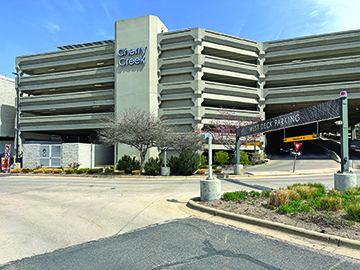
by Jessica Hughes | Apr 18, 2025 | Main Articles
by Jessica Hughes
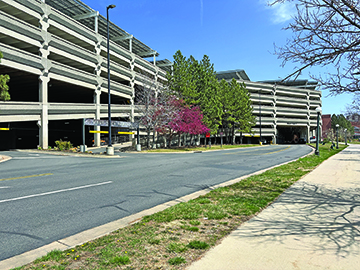
Cherry Creek Shopping Center now charges employees to park in its garages.

Employees and customers now both must pay to park in the Cherry Creek West Deck garage.
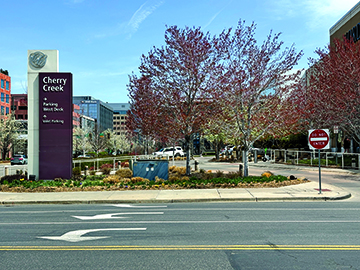
Cherry Creek Shopping Center employs over 3,000 people.
The Cherry Creek Shopping Center now requires employees to pay to park when clocking in for work, a change that has sparked confusion and frustration among workers. As of April 1, 2025, employees now must pay $20 per month if paid online or $25 per month if paid in person. Prior to this change, employees paid a one-time $30 refundable deposit to park.
When news broke out about this change, Michael Wilson, the Cherry Creek Shopping Center General Manager, said this had been in the plans since the mall first announced paid parking for customers in 2017, which received a similar response from mall patrons.
“Free parking for our tenant employees was always intended to be a short-term benefit that we offered when we originally implemented our paid parking program,” Wilson said. If this had always been in “the works,” why was it announced eight years later? A question Wilson did not specifically answer.
In 2017, the announcement of paid parking for customers was framed as a benefit that would ensure mall patrons had a spot to park by preventing non-shoppers taking up spots in the garage and parking lots. In fact, a Denverite article published in 2017, stated that the “roughly 3,500 people who work within the shopping center won’t be expected to pay for parking, the mall previously said in a statement.”
There was even reassurance that “fees are expected to be waived for the Cherry Creek Fresh Markets, Cherry Creek Arts Festival, Cherry Creek Sneak, and other community events,” which is also not the case anymore.
Employees are outraged both with the change and the timing of its announcement. “I don’t drive to work, so I don’t have to worry about it, but I still think it’s a crummy thing to do,” says a current employee at the Warby Parker store. “Everyone at this location thinks it’s stupid and is a cash grab from the mall by exploiting its employees. They’re basically pricing out people who want to work here. It’s a raw deal on all sides.”
But in a city where you pay to park almost anywhere you go, this doesn’t seem too far out of left field. “Free tenant parking is not a benefit widely offered at other businesses in the Cherry Creek neighborhood other than for those retailers who choose to pay for their employees’ parking, many of those spaces are significantly more per month.”
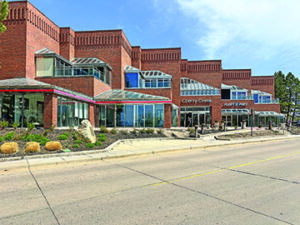
Cherry Creek Shopping Center.
He’s correct. Christina Lewis, a full-time salaried employee at Brillant Earth located in Cherry Creek North, pays $140 a month to park in the Clayton Lane West Garage, adjacent to Whole Foods. And with monthly parking rates at the Fillmore Plaza Garage even higher, at $170 a month, $20 a month doesn’t seem like much. But for both the mall employees who are part time high school and college students and the Simon Property Group who owns the mall, the monthly fee adds up.
With roughly 3,000 employees working at the mall, this new fee could generate around $900,000 per year (assuming each employee paid the full monthly fee of $25), a significant amount that plays out well for Simon Property Group, but not its workers.
“It’s $240 a year just to come to work. That sucks,” says the employee at Warby Parker. They say some stores are paying for employee parking. “Particularly billion-dollar corporate stores like Sephora. But some either don’t have the money to pay for their employees or are greedy themselves and refuse to.”
Employees also haven’t heard of any plans about how the additional money might be used. “There’s nothing we see that money going toward. No mall security, no nicer facilities, no fixes when we need them,” says the Warby Parker employee. When asked if there were any plans for improvement with additional income, Wilson did not provide any details or insight into this question.
With no planned improvements on the docket and plenty of back peddling about the rationale behind the decision, this new change seems to only hurt employees and benefit the wealthy corporation implementing it.
All photos by Jessica Hughes

by Charles Bonniwell | Apr 18, 2025 | Main Articles
City Council To Decide On June 30th Whether To Eliminate All Parking Requirements
by Charles C. Bonniwell

Parking Woes: Denverites may find it increasingly difficult to locate parking spaces around Denver if the City Council adopts a proposal to eliminate all parking requirements in the city.
The Denver Planning Commission has passed on a recommendation to the Denver City Council to let developers decide what, if any, parking will be provided for a project, and allow existing businesses and housing complexes to eliminate any and all existing parking requirements.
Denver has some of the least demanding parking requirements in the state with city ordinances requiring:
1 parking space per dwelling unit.
2 parking spaces per retail or office space.
4 parking spaces per thousand feet of a bar or restaurant space.
In comparison, the City of Glendale requires 1.5 parking spaces per dwelling unit, 4 per thousand feet of retail or office space and 11 per th
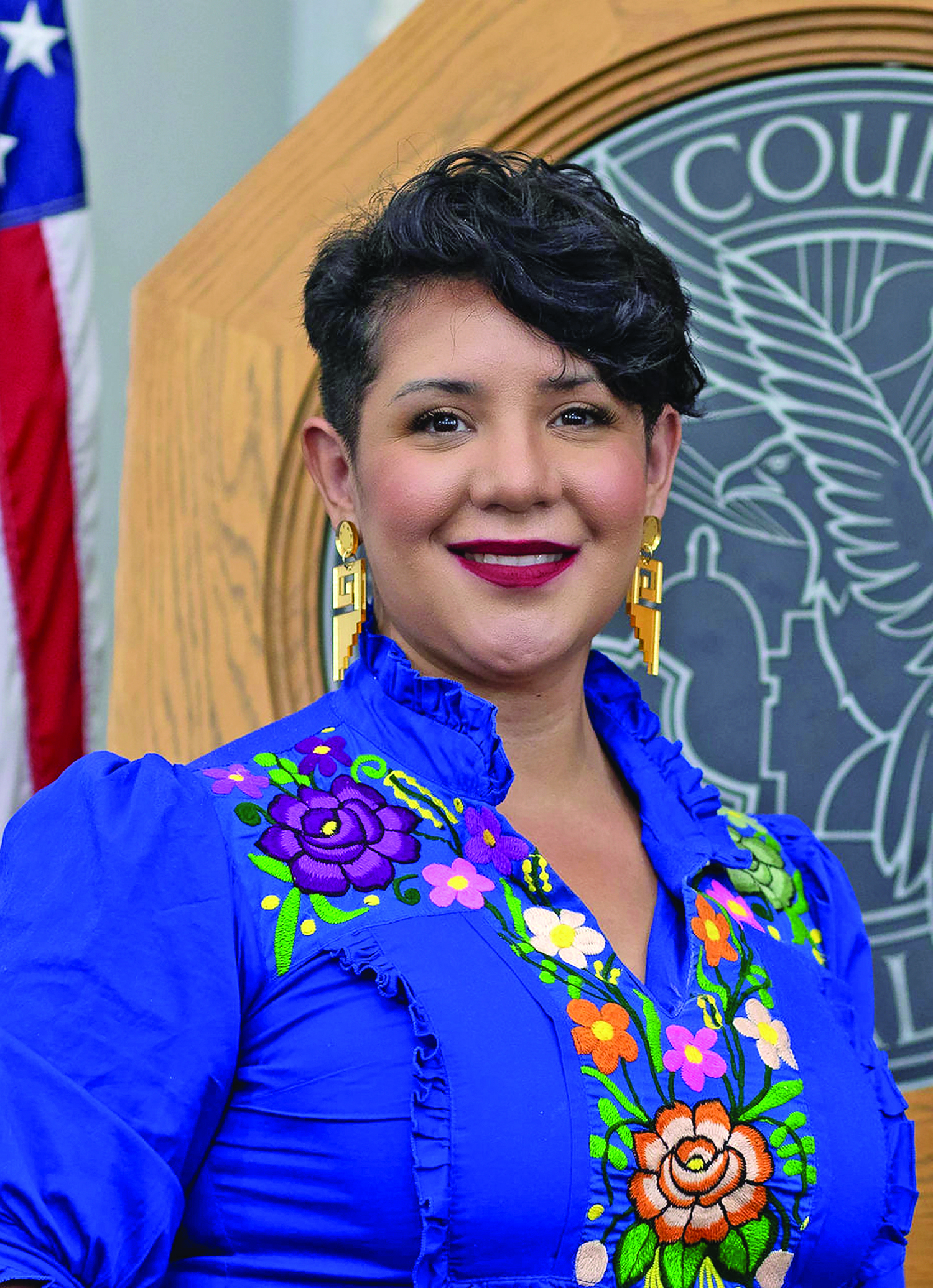
Flor Alvidrez: The Councilwoman for District 7 believes that by adopting the proposal for eliminating all parking requirements for Denver the city will be helping to fulfill its moral obligation to address climate change.
ousand feet of bar or restaurant space.
The Planning Board’s recommendation is strongly supported by Mayor Mike Johnston and various more progressive City Council members. “Let the market decide” is not a phrase often used by progressive politicians but is constantly invoked in this parking battle. Opponents have responded
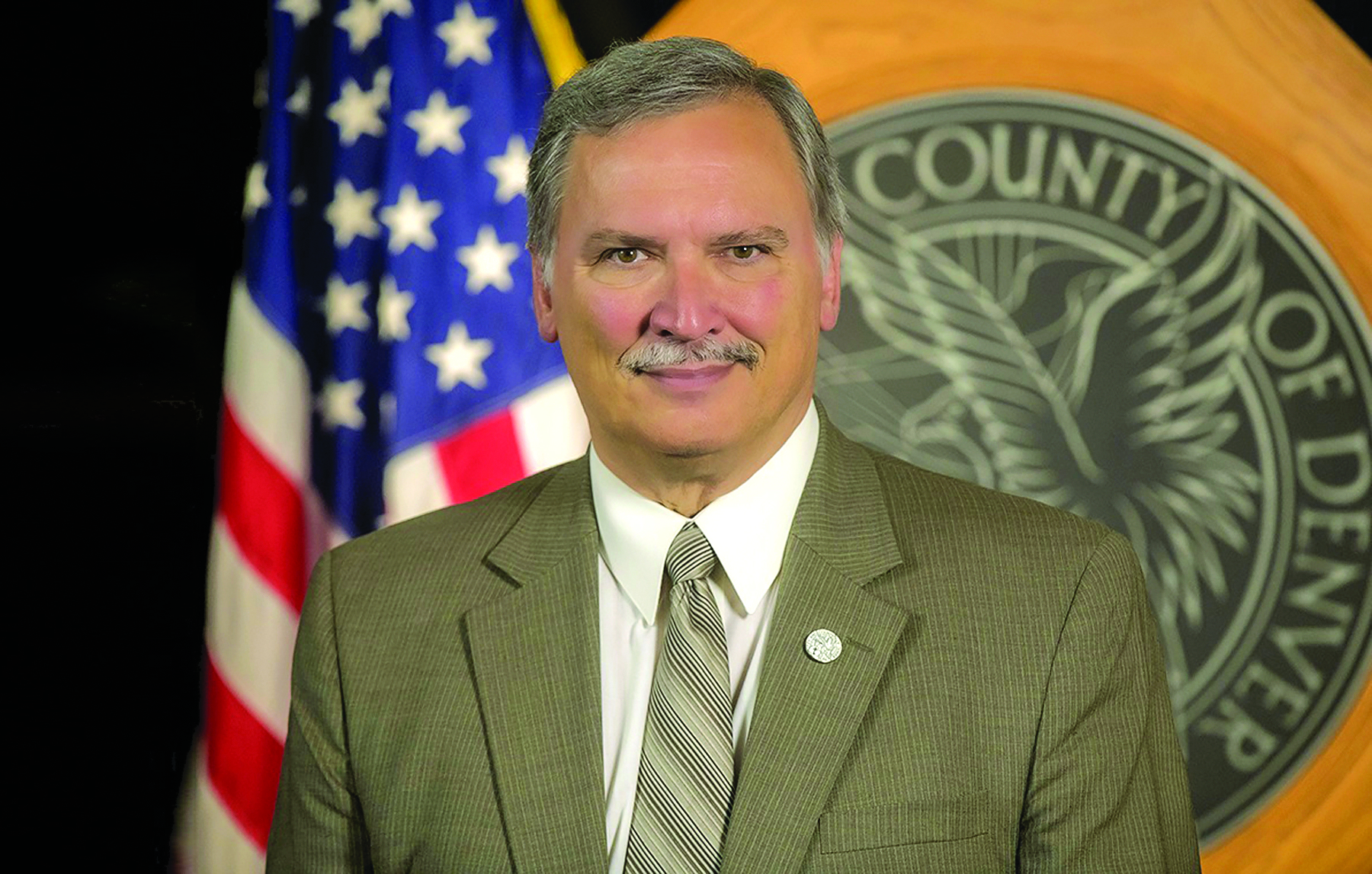
Kevin Flynn: The District 2 Councilman worries the elimination of all parking requirements will result in fewer housing projects in Denver for families.
that, in fact, if “let the market decide” is a new guiding principle there is no reason for zoning laws or planning commissions to exist at all.
Rachel Marion, Denver Planning Board member, argued that doing away with all parking requirements would “open up a lot of creativity, development, and vibrancy downtown and in a number of spaces.”
One disputes that it would also result in far fewer empty parking spaces in various parts of the city and making it more difficult to drive to a Denver location. According to proponents of the proposal, such a result would be a positive and not a negative result of the proposal.
Progressives generally do not support the use of automobiles since, among other detriments, it increases the use of fossil fuels, which in turn increases global climate change. They argue individuals, if forced to, will walk, use bikes, or employ public transportation. City Councilwoman Flor Alvidrez has asserted, regarding the proposal, that Denver has a moral obligation to address climate change, and the proposal is one way to help address that obligation.
Not all members of Denver City Council are on board with eliminating all parking requirements. Councilwoman Amanda Sawyer has asserted that she has surveyed her constituents and concluded: “My residents don’t want this.”
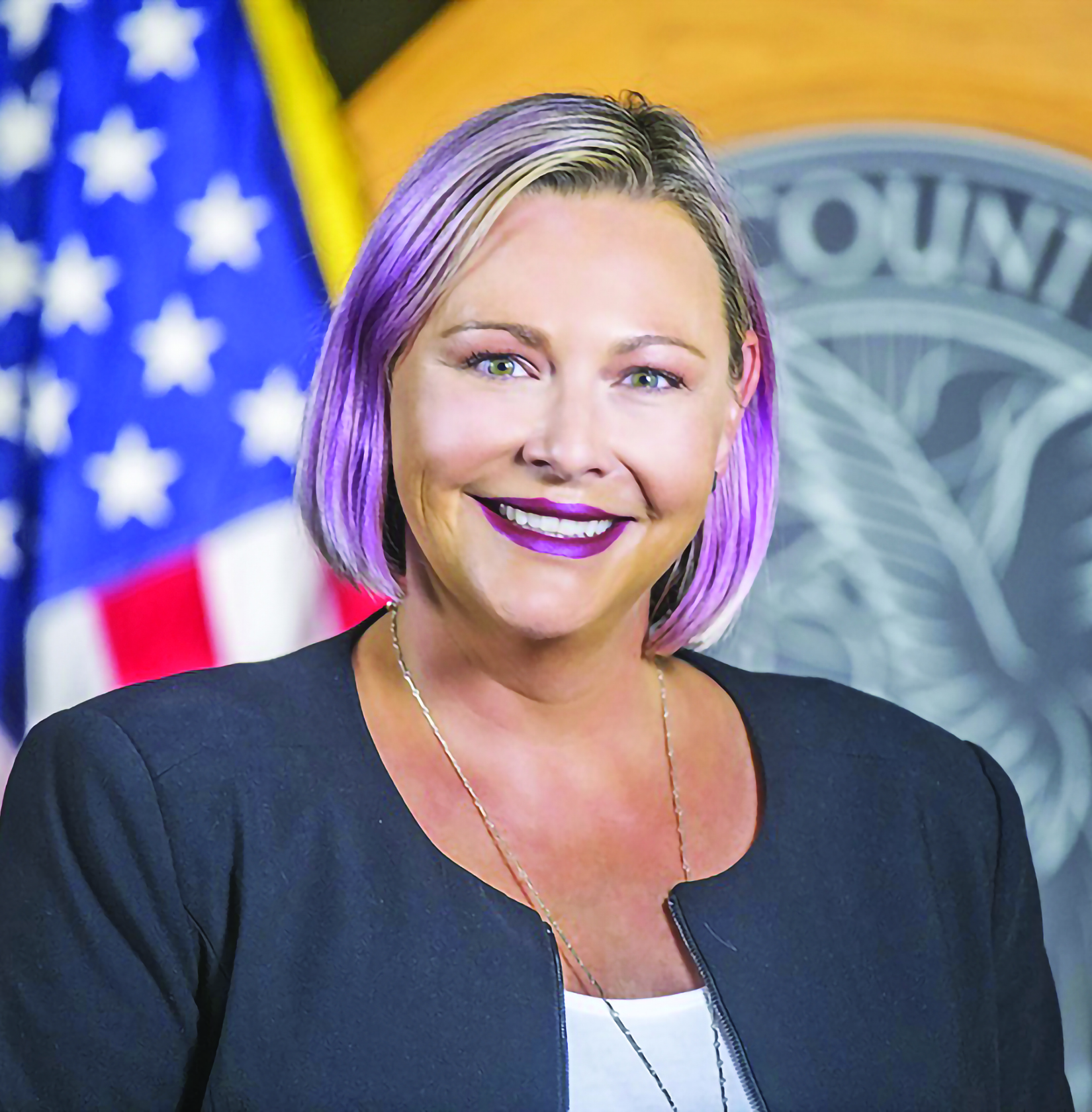
Amanda Sawyer: The District 5 Councilwoman has stated her residents simply do not want the proposed elimination of all parking requirements for the City and County of Denver.
City Councilman Kevin Flynn noted that the proposal will limit new housing for families as parents with young children often depend on automobiles to take the entire family to a location.
The cost of providing a parking space is estimated to be $50,000 and thus developers generally seek to limit the number of spaces they need to provide. If possible, they prefer to cannibalize existing street parking but that may make it difficult not to clog up residential streets across the city.
In some residential streets, street signs have already appeared declaring parking on a particular street is restricted to “residents only.” Opponents of the proposal also fear that owners of apartment buildings. will see the proposal as an opportunity to build on lots for a cash infusion.
Colorado citizens living outside Denver are not immune from the desire by some to get rid of parking requirements. Last year, the Colorado Legislature passed a law HD 24-1304 which stopped local governments from enacting and enforcing minimum parking laws for apartments and other multi-family residential projects near high frequency bus and train lines in Colorado’s largest metro areas. It is anticipated that 15 home rule cities will file a lawsuit claiming that the law violates the state constitution regarding the powers of home rule cities in Colorado.
It has become clear that many politicians both locally and statewide view the use of automobiles by individuals as undesirable and it must be restricted to the greatest extent possible for the common good. Whether the citizens of Denver and Colorado concur has yet to be determined.























